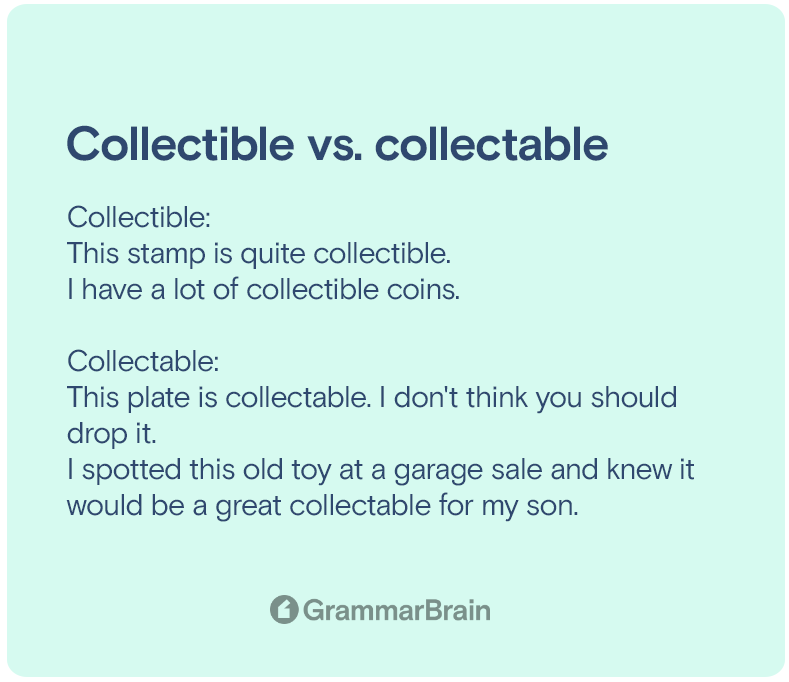Is it collectibles or collectables? Do you collect things? Maybe you have a few items from your childhood that you’ve held on to. Or maybe you’re the type of person who likes to hoard every penny so you can buy the newest and rarest item on the market. But what is it about these objects that compel us to gather them? And when to use the word collectible or collectable? Let’s find out!

What is the Difference Between “Collectible” and “Collectable?”
If you’re a collector, you may have noticed that there are two words commonly used to describe items that are sought after and cherished: collectible and collectable. While they may seem like interchangeable terms, there is actually a subtle difference in meaning between the two.
A “collectible” item is one that has a high value because of its limited availability or rarity, often because it is no longer being produced. On the other hand, a “collectable” item may not necessarily have an inflated market value, but it still holds personal value to the collector.
So while your grandmother’s vintage tea set might be highly collectible for antique enthusiasts, your childhood coin collection may simply hold sentimental collectable value for you. At the end of the day, both words acknowledge that an item is treasured by a collector – whether for its market worth or personal significance.
| Word | Definition |
| Collectible (adjective) | (of an item) worth collecting; of interest to a collector. |
Examples of “Collectible” and “Collectable” in Sentences
Collectible
- This stamp is quite collectible.
- I have a lot of collectible coins.
- My grandmother has a large collection of porcelain figurines that are quite collectible.
- I am always on the lookout for collectible glass bottles.
- I have a few friends who are into collecting comic books – they are very collectible.
Collectable
- This plate is collectable. I don’t think you should drop it.
- I spotted this old toy at a garage sale and knew it would be a great collectable for my son.
- She has an extensive collection of rare stamps that she considers to be valuable collectables.
- He keeps all of his baseball cards in protective cases so they will stay in mint condition and be considered valuable collectables someday.
- I know that he doesn’t care about most of his things, but to him, his comic books are valuable collectables.
When to use the word “Collectible”
The word “collectible” can be used to describe items that are collected for a hobby. Or it can be used to describe items that have value because they are rare or no longer in production.
For example, you can use the word “collectible” to describe a stamp that you collect because you like the design. You can also use the word “collectible” to describe a stamp that is rare and has been discontinued.
When to use the word “Collectable”
The word “collectable” can be used to describe an object that is collected or that is worth collecting. For example, you can say that a stamp is collectable because people collect stamps.
The word “collectible” can also be used to describe something that is collectable, but it has a slightly different meaning. A collectible usually refers to something that is not as valuable as a collectable, but it is still worth collecting.
Conclusion
Though the two words are often used interchangeably, they actually have different meanings. The key difference is that not all collectables will appreciate as a true collectible does. Thanks for reading, and we hope this helped clear up any confusion between these two similar-yet-different terms.
Inside this article
Fact checked:
Content is rigorously reviewed by a team of qualified and experienced fact checkers. Fact checkers review articles for factual accuracy, relevance, and timeliness. Learn more.
Core lessons
Glossary
- Abstract Noun
- Accusative Case
- Anecdote
- Antonym
- Active Sentence
- Adverb
- Adjective
- Allegory
- Alliteration
- Adjective Clause
- Adjective Phrase
- Ampersand
- Anastrophe
- Adverbial Clause
- Appositive Phrase
- Clause
- Compound Adjective
- Complex Sentence
- Compound Words
- Compound Predicate
- Common Noun
- Comparative Adjective
- Comparative and Superlative
- Compound Noun
- Compound Subject
- Compound Sentence
- Copular Verb
- Collective Noun
- Colloquialism
- Conciseness
- Consonance
- Conditional
- Concrete Noun
- Conjunction
- Conjugation
- Conditional Sentence
- Comma Splice
- Correlative Conjunction
- Coordinating Conjunction
- Coordinate Adjective
- Cumulative Adjective
- Dative Case
- Determiner
- Declarative Sentence
- Declarative Statement
- Direct Object Pronoun
- Direct Object
- Diction
- Diphthong
- Dangling Modifier
- Demonstrative Pronoun
- Demonstrative Adjective
- Direct Characterization
- Definite Article
- Doublespeak
- False Dilemma Fallacy
- Future Perfect Progressive
- Future Simple
- Future Perfect Continuous
- Future Perfect
- First Conditional
- Irregular Adjective
- Irregular Verb
- Imperative Sentence
- Indefinite Article
- Intransitive Verb
- Introductory Phrase
- Indefinite Pronoun
- Indirect Characterization
- Interrogative Sentence
- Intensive Pronoun
- Inanimate Object
- Indefinite Tense
- Infinitive Phrase
- Interjection
- Intensifier
- Infinitive
- Indicative Mood
- Participle
- Parallelism
- Prepositional Phrase
- Past Simple Tense
- Past Continuous Tense
- Past Perfect Tense
- Past Progressive Tense
- Present Simple Tense
- Present Perfect Tense
- Personal Pronoun
- Personification
- Persuasive Writing
- Parallel Structure
- Phrasal Verb
- Predicate Adjective
- Predicate Nominative
- Phonetic Language
- Plural Noun
- Punctuation
- Punctuation Marks
- Preposition
- Preposition of Place
- Parts of Speech
- Possessive Adjective
- Possessive Determiner
- Possessive Case
- Possessive Noun
- Proper Adjective
- Proper Noun
- Present Participle
- Prefix
- Predicate



